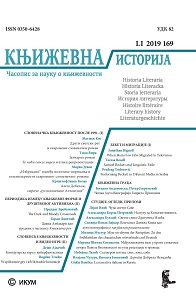Сталкеров поглед: свет, зона, соба
Stalker’s View: The World, the Zone, the Room
(Andrei Tarkovsky’s Thought on the Man and the World and Its Visualization in Stalker)
Author(s): Nebojša LazićSubject(s): Russian Literature, Film / Cinema / Cinematography
Published by: Институт за књижевност и уметност
Keywords: A. Tarkovsky;film;intersemiotic quotation;space;time;
Summary/Abstract: Deleuze’s notable idea that a director should not be viewed only as a visual artist but also as a thinker is best confirmed in the films by the Soviet and Russian director Andrei Tarkovsky, especially in his most successful achievement, film Stalker which appeared in 1979. In Stalker, as well as some other films, Tarkovsky did not hesitate to use the ready-made works of art intersemiotically, in their original or changed form, and to insert them in the tissue of his films. The director, however, ensured that these intersemiotic quotations, such as the poems of Arseny Tarkovsky and Fyodor Tyutchev or the music of Bach and Beethoven, should not disturb the organic monolith of his films. There were attempts to proclaim Andrei Tarkovsky a dissident and political opponent of the Soviet regime, but until his early death in 1987, he saw himself as a creator deeply immersed in the tradition of Russian spirituality and art. Tarkovsky’s greatest contribution to the theory of film lies in the fact that he proved film to be not only mere moving pictures, a cinematograph, but time captured and presented as being, as a time filled with existence – Bergson’s duration.
Journal: Књижевна историја
- Issue Year: 51/2019
- Issue No: 169
- Page Range: 365-383
- Page Count: 29
- Language: Serbian

